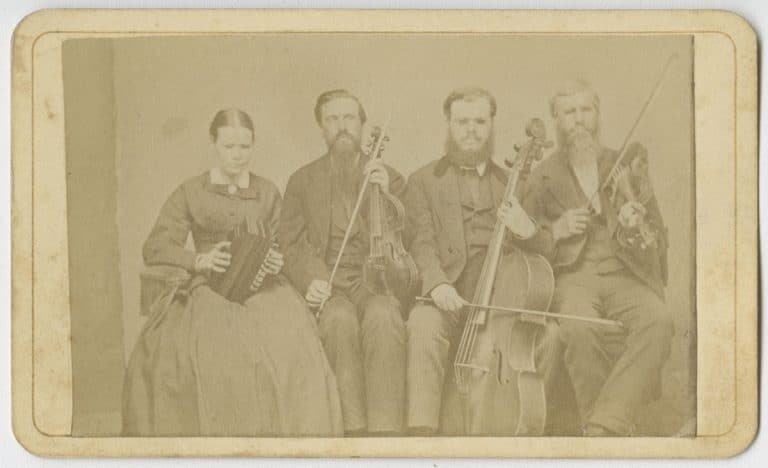Music
Items relating to music in the Library Company of Philadelphia can be found in the books, graphics, and manuscripts collections. The focus of the music collection is on Americana with particular attention paid to Philadelphia.
In the 19th century, the development of lithography facilitated the production of affordable printed music and Philadelphia became a center for both music publishing and lithography. Many pieces of sheet music include illustrated covers depicting buildings, famous individuals, or genre scenes. Philadelphia retailers such as George Willig, Alexander Fiot, and the firm Lee & Walker sold sheet music by European and American composers, and their inventory is well-represented in our holdings. Sheet music was often simplified piano versions of the symphonies and operas heard in concert halls created for domestic use by amateur musicians. Dance music, including waltzes, polkas, and quicksteps arranged for piano, also proved popular in sheet music form. Our sheet music collection comprises approximately 17,000 pieces, ranging in date from the 18th through the early 20th centuries.
Songsheets form another strength of the music collection. Our approximately 3,000 mid-19th century songsheets (text without musical notation meant to be sung to popular tunes) address issues such as race, ethnicity, love, disasters, and gender roles. Also, within the book collection researchers can find playbills for musical events, primarily in Philadelphia from the late 18th through the post-Civil War era, and musical instruction manuals.
Important manuscript collections include the William Henry Fry (1813-1864) Collection containing lyrical tragedies, choral works, and orchestral and chamber music; a manuscript composition book including about eighty tunes by Black composer and Philadelphia bandleader Francis Johnson (1792-1844); and the Albert G. Emerick (1817- 1898) Collection of musical copy books containing transcriptions, arrangements, and original compositions by this Philadelphia music teacher and organist.
The Graphic Arts Collection includes images of musicians and musical groups, both amateur and professional, musical venues, and advertisements for musical goods suppliers with the emphasis on Philadelphia from the late 18th through the early 20th century.
Resources
Bibliographies
- Allen Perdue Britton, Irving Lowens, and Richard Crawford. American Sacred Music Imprints, 1698-1810: A Bibliography (Worcester, 1990).
- Harry Dictor and Elliott Shapiro. Early American Sheet Music: Its Lure and its Lore, 1768-1889. New York: R. R. Bowker Co., 1941. (Annotated to LCP holdings)
- Irving Lowens. A Bibliography of Songsters Printed in America before 1821 (Worcester, 1976).
- Oscar Sonneck and William Upton. A Bibliography of Early Secular American Music. Washington: Library of Congress, 1945. (Annotated to LCP holdings)
- William T. Upton. The Musical Works of William Henry Fry (Philadelphia, 1946). (Catalog of LCP holdings)
- Sarah Weatherwax. A Noteworthy City: Music in Philadelphia, 1750-1915. (Library Company of Philadelphia 1997 exhibition catalog)
- Edwin Wolf 2nd. American Song Sheets, Slip Ballads, and Poetical Broadsides, 1850-1870: A Catalogue of the Collection of the Library Company of Philadelphia (Philadelphia, 1963).
- Richard J. Wolfe. Secular Music in America, 1801-1825: A Bibliography (New York, 1964). 3 vols.
Online Resources / Links
Search Terms
Composers
Concerts
Music-Instruction and study
Music-halls
Patriotic music
Popular music
Sheet music
Singing-Instruction and study
Songs and music
Songsters
Search Terms by Name of Collectors/Collection
- William Henry Fry (1813-1864) Collection

